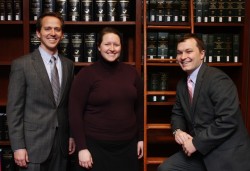 From left: Team members Robert Thole, Amanda Atherton and Renner Walker. |
A team of three Drake University law students recently advanced to the quarterfinal round of the National Environmental Moot Court Tournament, which drew 72 teams from law schools across the country to Pace University Law School in White Plains, N.Y.
The Drake Law School Environmental Moot Court Team of Amanda Atherton, Robert Thole and Renner Walker performed well in three preliminary rounds to reach the quarterfinals. Atherton, a third-year law student from Fenton, Mich., and captain of the team, received the Best Oralist award in Round III. This award is given to just one of the six contestants in each round.
Walker, a second-year law student from Windsor Heights, Iowa, and Thole, a second-year student from Dyersville, Iowa, presented oral arguments in the quarterfinal round against Vermont Law School and the University of Maryland School of Law.
“Both of those schools put a lot of emphasis on environmental law, so it was a tough draw,” said Jerry Anderson, faculty adviser for the team and Drake’s Richard M. and Anita Calkins distinguished professor of law.
“The team did an excellent job and the round appeared to be incredibly close. Vermont prevailed, but the judges said it was not a unanimous decision. Everyone on the Drake team put a great effort into the competition and represented Drake Law very well.”
Atherton said the competition was a valuable learning experience. “It’s nice to feel that we could be competent appellate advocates after this,” she added.
The competition required each team to write a 35-page brief in the appeal of a complex environmental law case during the fall semester, and then compete in oral arguments in late February.
This year’s case concerned hazardous waste and the complex relationship between state and federal regulatory authorities. Typically, the federal government allows each state to handle administration and enforcement of federal environmental laws, but what happens when the state’s program becomes woefully inadequate due to budget cuts and other shortcomings? When must the federal government take over the program?
“The issue was incredibly complicated and the Drake team did a wonderful job of figuring out how to untangle a web of legal issues,” Anderson said. “This had to be the most complex problem I have ever seen in a moot court competition. We had tremendous support helping prepare the team for the tournament, including several alumni, current students and professors.”
Among those helping the Drake team were alumni Charles Isaacson, Larry McLellan, Tamara Mullen and Jennifer Smithson, as well as faculty members Gordon Allen, Ian Bartrum and Laurie Doré.

